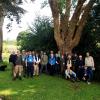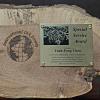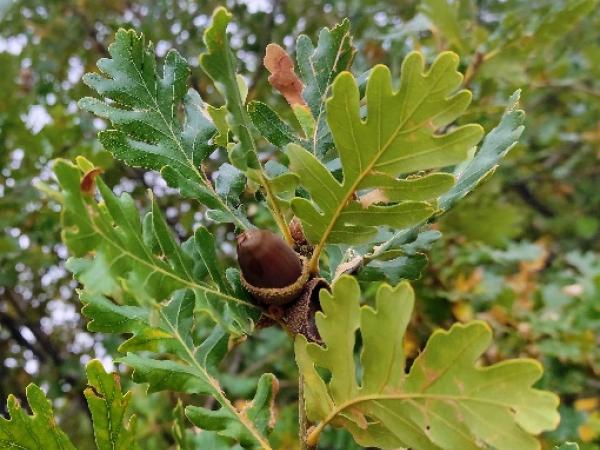Editor's Picks
Plant Focus
If you participated in the International Oak Society's 6th Triennial Conference in Puebla, you probably have fond memories, interesting ideas and helpful suggestions to share with fellow members. If you could not participate in the Conference, read on ! It will convince you that you should not miss the next : 2012, France !
To have your comments included, just log on to the web site and go into the menu Create Content. You then create a news item and put as its title "Recuerdos" followed by your name. Remember there is always a delay between when information is submitted and when it is published (this is a security measure for content control). If for some reason you have difficulties with this, please let me know (arboretum.pouyouleix@wanadoo.fr or through the contact form on the website. Béatrice Chassé
Ondrej Fous, Quercetum Placek
We lost all of the tequila which we had with us in Amsterdam, but the acorns survived and are now beginning to germinate. So on the whole, the trip was a great success, if a bit unfortunate at the end.
Yes, there are not yet many IOS members in the Czech Republic, but that can change! We are looking for other enthusiastic people in our area, but that will take time. During the past couple of weeks I have spoken with a few people, and I think that it would be a good idea to organize an IOS visit sometime during the next five years to the Pruhonice oak collection (an old planting) and Placek (a young one).
Regarding Mexico, we have the following thoughts: In general, the trip was very useful for our efforts to recognize high quality and the value of collections when measured by world standards. We made dozens of contacts with like-minded people, and enjoyed close fellowship with many. Meeting them was easy, and all were ready to help with their experience. With a high diversity of ages and kinds of interests, this society is certain to thrive, and I am certain that it will outlast many. Personally, I felt very much at home with the society members in Mexico, as with old time friends, oaks with a human face, so to speak.
Very significant for us in Mexico were the forestry aspects of oak ecology. In the country with the highest diversity of oaks in the world, oaks have a major impact on the quality of life there. This is a question which I had never considered before. Oaks are a natural part of forests and they are everywhere. Even in central Europe we would hate to lose our oaks. Without them, our life would be poorer.
Long live the IOS!
Guy Sternberg, Starhill Forest, Illinois, USA
"Most of what I would have said already has been covered by previous comments. I always look forward to these triennial gatherings of oak people from so many countries, and I am already saving money to come to France in 2012!"
Dan Keiser, The Oak Man, Minnesota, USA
"I have a 6' potted tree in my apartment that I grew from an acorn that I picked up in Chiapas while video-taping Sub-Comandante Marcos puffing on his pipe in 2001. Never knew what it was & always called it the Zapatista Oak. Well, on day one of the 2009 IOS pre-conference trip, we went exploring en el bosque de los encinos de la montana del Ajusco, and there it was in all of it's newly identified glory...Q. rugosa! At long last; what a thrill! Now I could die a happy man. El fin."
James Hitz, Taltree Arboretum, Indiana, USA
"Pre/post conference tours and conference in Puebla and surrounding areas was most engaging, as are all IOS conferences and tours. From cloudforests to dry mountains, desert, and sub-tropical mesic forest there was a species richness to be savored. Seeing venerable old oaks I will never see elsewhere was like tasting a vintage wine of extraordinary depth."
Ron Lance, Balsam Mountain Preserve, North Carolina, USA
"I was struck again by the friendliness and helpful manner of the Mexican people. Knowing next to no Spanish proved only a minor inconvenience on my part. Plant-gazing was a highlight for me, and like most of the IOS post-tour participants, I was grateful to cast eyes onto Q. insignis. This mega-fruited oak has had a reputation preceeding it for some time, and it was not a disappointment."
Kunso Kim, The Morton Arboretum, Illinois, USA
"The IOS conference in Puebla was one of the most memorable meetings.
What I saw through the pre and post conference tours were eye-opening
experiences for me. I was aware of the species richness. But seeing them
there in different habitats in association with other plants was truly
remarkable. From subtropical through desert-like, to cloud forest
habitats, species adapted to the environments seem to have unique
characteristics. Seeing and collecting acorns of Quercus insignis and Q.
corrugata may have been highlight of the tours. Meeting oak enthusiasts
from all over the world and getting to know them also has made for many good memories."
"I enjoyed every moment of the conversations we had. I appreciated
the genuine interest in oaks and willingness to share knowledge.
Conservation of oak species is an issue in Mexico. I only hope that
there will be stronger incentives for the Mexican government to take
more aggressive action to conserve the oak habitats. It takes time and
serious efforts to see the initiative coming to fruition. I think it
is an urgent issue. I would like to see if the IOS can provide the
interested parties such as Puebla Botanical Gardens with any supports
and incentives toward conserving the oaks."
Tim Boland, Polly Hill Arboretum, Martha's Vineyard, USA
"What was so inspiring was the impressive and dedicated research of our Mexican hosts. I would have to say that Maricela and Allen have made a big difference to Mexican plant floristics and it was rewarding to take part in this conference and to meet so many new friends. As always some of the greatest dialog and sharing went on between sessions, bus rides, and over dinners. I am very much looking forward to our next meeting in France in 2012!"
Thierry Lamant, Office National de la Forêt, Orléans, FRANCE
"For me the most spectacular discovery was that volcanically chaotic place along the road side between Perote and Oriental. Such an extraordinary place with numerous populations of what appear to be as yet undescribed oak species. Also, it was quite interesting to notice the higher attention that Mexican researchers are giving to hybrids."
Diana Gardener, Quercus gardener, Oregon, USA
"The peaceful oasis of greenery and enlightened planning at the university campus in Puebla, the spacious arboretum managed by Maricela Coombes, with wetlands for waste water treatment, ambitious new oak plantings, and fine older oak specimens.
Maricela's practical philosophy for oak woodland restoration. Her affectionate regard for her students at her public university, and their efficient and cheerful assistance and participation during the conference.
Stimulating conference presentations, sometimes complex but almost always understandable even for a non-specialist. Discussing these topics and other oak related issues with attendees and presenters. The elation of being among smart, dedicated, engaging oak lovers.
Meeting up again with friends from past conferences and tours, and creating new friendships. Great fun!
An introduction to two lively and beautiful Mexican cities with intact urban cores and outstanding colonial architecture (Puebla and Cuetzalan -- I missed Taxco). Super food in Puebla, and the exceptionally fine produce and handicrafts market in Cuetzalan. The resonant sound of devotional singing by the congregation during Sunday mass in the cathedral at Cuetzalan.
A view of the rich agricultural region near Puebla, and the experience of the cloud forest landscape, vegetation, and pouring rain in the Sierra Norte de Puebla. Two particularly magical oaks, Q. insignis and Q. corrugata, mature individuals shading coffee plantations, integrated into the lives and livelihoods of farmers.
The care given to our comfort and safety."
Béatrice Chassé, Arborétum des Pouyouleix, FRANCE
"Without a doubt, the cloud forest has left a huge impression on me. I was literally moved to tears amidst all that extraordinary vegetation. The incredible energy and promiscuity of it ! A French botanist, Francis Hallé, wrote something to the effect of : being in the temperate forest is like being on the balcony, being in the tropical forest is like being in the first row. I always understood what that meant, but now I have lived it. I must admit I think he is right !"
Béatrice Chassé
President















